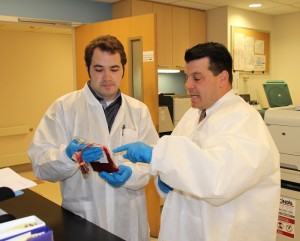Category: Published Science Articles
Palm Oil Shopping App Helps Endangered Orangutans
Most of Missouri’s native bees are thriving

Photo by Mike Arduser, Missouri Department of
Conservation
If you visit one of Missouri’s native prairie reserves when the coneflowers are blooming, you will see plenty of bees buzzing around them. You may not realize that some of these bees are a single species that collects pollen only from the pale purple coneflower and only on native prairie. This coneflower specialist flies for just a few weeks each year, collecting the pollen that will feed its offspring until the coneflower blooms again.
The coneflower bee, like the approximately 450 other bee species native to this area, seems to be doing OK. With a few important exceptions, according to Missouri Department of Conservation naturalist Mike Arduser, the native bee pollinators have been holding their own. Arduser has been keeping track of bee diversity in the Midwest for about thirty years.
Continue reading Most of Missouri’s native bees are thriving
Children’s Hospital physician heads study on blood transfusions in children

Ronald Jackups, MD, PhD, about the blood
supply at St. Louis Children’s Hospital.
Dr. Philip Spinella served twelve years in the United States military, including a year treating traumatic injuries in the 31st Combat Support Hospital in Baghdad. During his deployment, he was also part of a small group of physicians evaluating transfusion practices in treating hemorrhagic shock resulting from battlefield injuries.
Spinella co-authored multiple studies with others from his group indicating that transfusion of red blood cells stored for a prolonged period may be associated with an increase in complications and mortality. One such report concluded that fresh whole blood was preferable to the stored blood components (red cells, platelets, and plasma) that had been shipped from the states. These cells had been stored for longer than 21 days, with median storage time of 33 days. The report concluded that while the risk of viral infection from fresh blood was very slightly higher even after prescreening, fresh whole blood was superior to aged cells in terms of improved physiological effects such as cardiac output and better clinical outcomes.
Continue reading Children’s Hospital physician heads study on blood transfusions in children
ReSpectacle
“There is writing on that blackboard!”
“Hey, those people on stage have features on their faces!”
“I don’t really have to read the newspaper from across the room!”
These are common enough reactions to a new pair of eyeglasses, especially to that first prescription. But in many parts of the world—and for many people in this country—the cost of prescription eyeglasses is prohibitive.

When Jeffrey Lynch travelled to Peru in 2006 as a medical student on a mission trip to perform eye surgeries, he realized that most of the people who came to the clinic with eye problems just needed eyeglasses. However, in the area he visited, only the wealthy could afford to have their prescriptions filled. In fact, the World Health Organization estimates that about 280 million people in the world have low vision (moderate to severe impairment) and that glasses could correct the sight of more than half of them.
Many medical missions travel with boxes of donated eyeglasses, but the chance of finding a pair of glasses in those boxes with correct prescription match and acceptable style frames is slim.
Continue reading ReSpectacle
